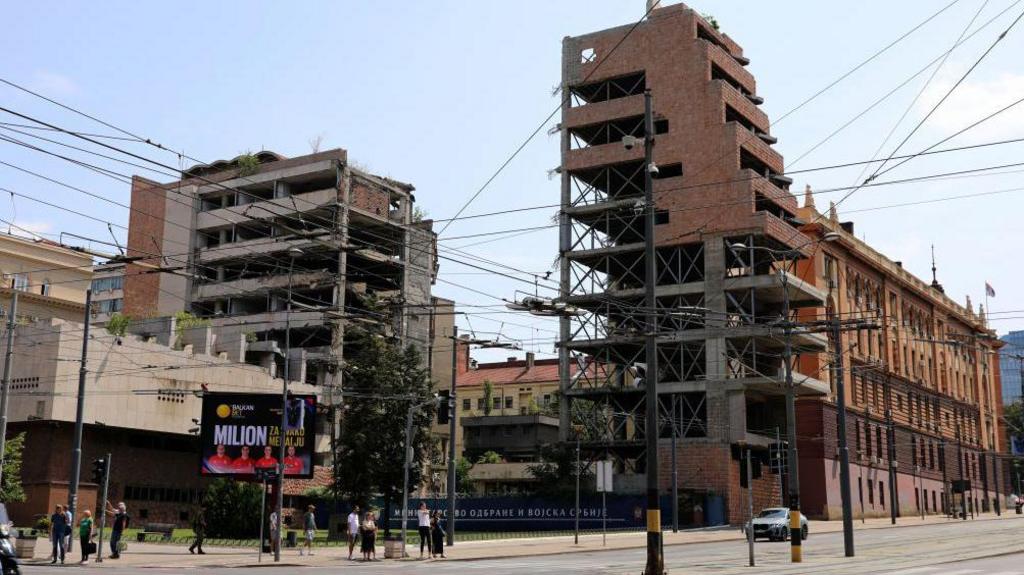Visitors to Belgrade are immediately confronted by the dilapidated remains of government buildings, bombed by NATO in 1999. These structures serve as a stark reminder of Serbia’s turbulent past and its ongoing struggle with historical trauma.
The damaged Defence Ministry buildings stand as a poignant symbol, a testament to the NATO intervention aimed at halting Serbia’s military campaign in Kosovo. The US, as a NATO member, was directly involved in the bombings.
Therefore, the Serbian government’s 2023 decision to partner with Affinity Global, an American company founded by Jared Kushner, on a $500 million (£370 million) redevelopment into a luxury complex called Trump Tower Belgrade, initially surprised many.
This decision, however, aligns with a pattern – as alleged by the Serbian opposition – of the government enabling foreign investors to profit from public assets. The Belgrade Waterfront project, developed by Emirati firms on Serbian railway land, serves as a prominent example of this alleged practice.
While the Waterfront project transformed a derelict site, the Defence Ministry complex presents a unique challenge. Its historical significance as a memorial to the 1999 bombing casualties and its potent symbolism for pro-Russian sentiment in Serbia add layers of complexity.
Granting a 99-year lease to a US developer, reportedly without upfront payment, is a bold move, particularly considering the widespread anti-NATO sentiment in Serbia. President Aleksandar Vučić defends the deal, stating it’s crucial to move past the legacy of 1999 and foster stronger US relations.
This perspective resonates with Belgrade’s international business community, which acknowledges the need to attract foreign investment to boost Serbia’s relatively low GDP per capita, which is one-third of the EU average. While financial specifics are undisclosed, the New York Times reported the Serbian government will receive 22% of future profits.
James Thornley, a financial consultant in Belgrade, believes the development will ultimately benefit Serbia, highlighting the positive publicity associated with attracting major international investment. However, not all investors share this optimism.
Andrew Peirson, a real estate expert, while acknowledging the deal’s potential benefits, raises concerns about the lack of a transparent tendering process, questioning whether market value was obtained for the site. He contrasts this with the standard procedures in other European countries.
Adding another layer of complexity, the deal involved meetings between President Vučić and Jared Kushner, followed by visits from Donald Trump Jr., raising questions about potential conflicts of interest. While the Trump family’s involvement is reportedly limited to the hotel component, concerns persist.
Mr. Peirson further expresses concern about the potential impact on other investors who were not given an opportunity to participate in bidding for the site. Neither Affinity Global nor the Serbian government responded to requests for comment on the tendering process.
Beyond the procedural questions, the project’s very nature is contentious. The buildings, originally designed by Nikola Dobrović and granted protected status in 2005, possess architectural and historical significance. Estela Radonjic Zivkov, a former deputy director of Serbia’s Institute for the Protection of Monuments, strongly opposes the demolition, highlighting the conflict with Serbian law.
A significant development emerged on May 14th with the arrest of Goran Vasic, the official who authorized the lifting of the complex’s protected status. His admission to fabricating an expert opinion has fueled accusations of preferential treatment for Kushner, a claim the Serbian government denies.
The future of the project remains uncertain. While Affinity Global issued a statement distancing itself from Vasic and promising to review the situation, the arrest throws the project’s future into doubt. President Vučić continues to assert the project’s validity, but the controversy surrounding the deal ensures that the Defence Ministry’s bombed-out façade will continue to be a major talking point in Belgrade for the foreseeable future.

